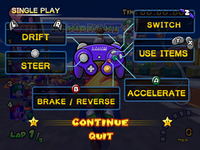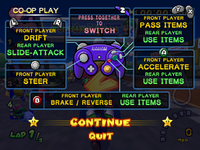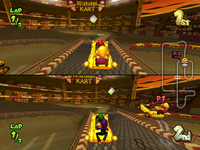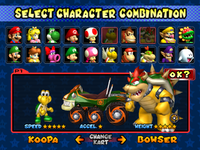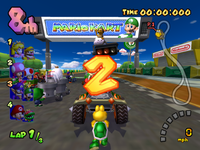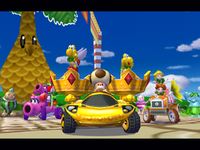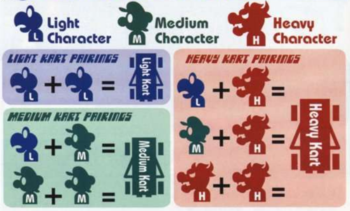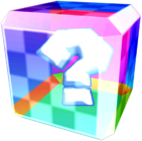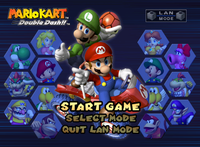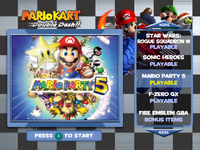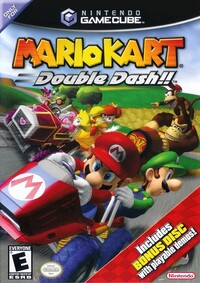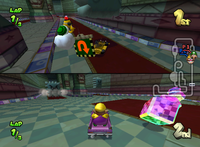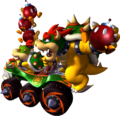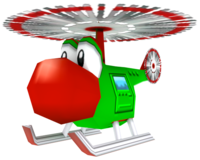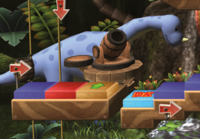Mario Kart: Double Dash!!
| Mario Kart: Double Dash!! | |||||||||||
|---|---|---|---|---|---|---|---|---|---|---|---|
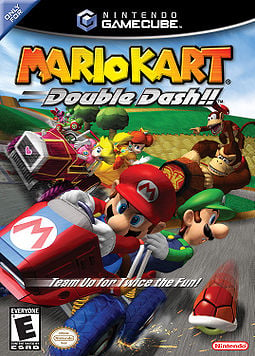 For alternate box art, see the game's gallery. | |||||||||||
| Developer | Nintendo EAD | ||||||||||
| Publisher | Nintendo | ||||||||||
| Platform(s) | Nintendo GameCube | ||||||||||
| Release date | |||||||||||
| Language(s) | English (United States) French (France) German Spanish (Spain) Italian Japanese | ||||||||||
| Genre | Racing | ||||||||||
| Rating(s) |
| ||||||||||
| Mode(s) | Single-player, multiplayer | ||||||||||
| Format | Nintendo GameCube:
| ||||||||||
| Input | Nintendo GameCube:
| ||||||||||
| Serial code(s) | |||||||||||
Mario Kart: Double Dash!! is a racing game developed and published by Nintendo for the GameCube and the fourth main entry in the Mario Kart series. It was released in November 2003 worldwide, being released in Japan first and later being rereleased as a Player's Choice title in Australia and New Zealand.[4] The game, while retaining many aspects of the previous Mario Kart games, such as selecting a Super Mario franchise character as the player's driver and the familiar item-based weaponry that the series employs, introduces a feature that is unique to this entry in the Mario Kart series: the two-person karts, hence the title of the game. Two characters handle a single kart, where one character drives and the other uses items, and they can switch positions at any time if necessary. This is the only game in the franchise where two players can play cooperatively in one kart, with each player handling a single character, though the option to play in separate 2-person karts for each player is still available. In addition, the game introduces Special Items, items that are exclusive to a pair of characters. The game is one of the few games to take advantage of LAN Mode via the Nintendo GameCube Broadband Adapter, which allows up to sixteen players to participate in a single race.
Mario Kart: Double Dash!! is the first Mario Kart game in the series to employ 3D graphics for characters and items, as opposed to Mario Kart 64 using pre-rendered sprites to display these objects. The game also introduces a larger variety of karts to select from depending on the character combo's weight class rather than the standard go-kart being the sole vehicle all racers use, and this variety of vehicles has been retained in all the Mario Kart games since.
New features
As with every new Mario Kart game, Mario Kart: Double Dash!! incorporates several new features, granting a new style of playing for the users. Apart from that, there are two characters per kart; the number of playable characters was increased to join the race. As implied in various Super Mario franchise games, Mario Kart: Double Dash!! contains many elements to unlock as well. By beating the cups available in every engine level, the player unveils other hidden levels, karts, and other playable characters in the game. Furthermore, there is a very dynamic selection of karts: every kart has specific stats that distinguishes from the others, as well as capturing their respective character's style; for instance, Mario's kart, the Red Fire. In the first three games, there was only one kart that the players could use, which was what Mario Kart 7 and games after this would eventually call the Pipe Frame.
When breaking Item Boxes, characters can receive any standard item or a Special Item, a new type of item unique to a specific pair of characters. Additionally, items dropped on the course, including Bananas, Shells, Mushrooms, and Stars, instantly affect the first kart that touches it. The effects of certain items have changed considerably as well.
Another notable change featured in the game is the point system given to the racers after a competition in Grand Prix mode. It resembles a hybrid of the point systems used for Formula One from 1991-2002 (10-6-4-3-2-1) and from 2003 onwards (10-8-6-5-4-3-2-1), whereas earlier Mario Kart games use a point system resembling the one used for Formula One from 1962-1990 (9-6-4-3-2-1). Additionally, players cannot retry a failed race in Grand Prix mode, as opposed to the first three games. Users have to continue racing until finishing a cup to see the overall results. This new system is used for all Mario Kart installments since this game. The following chart shows the difference of the point spreads from the previous games to Mario Kart: Double Dash!!
| Point spread comparisons | ||||||||
|---|---|---|---|---|---|---|---|---|
| 1st | 2nd | 3rd | 4th | 5th | 6th | 7th | 8th | |
| Super Mario Kart Mario Kart 64 Mario Kart: Super Circuit |
9 | 6 | 3 | 1 | 0 | 0 | 0 | 0 |
| Mario Kart: Double Dash!! | 10 | 8 | 6 | 4 | 3 | 2 | 1 | 0 |
This is also the first Mario Kart game that can be played in multiple languages, besides English and Japanese, and to feature live-rendered 3D models for the characters and items instead of the pre-rendered sprites seen in previous installments.
However, more than the new point system, Mario Kart: Double Dash!! also added important features that would become mainstays of the future Mario Kart titles. For example, before the start of every race, a short overview of the track, lasting a few seconds, shows all of the big features of the track, such as obstacles, scenery, and the characters at the finish line. Also, the countdown to the start of the race lasts for one second longer; in Mario Kart: Double Dash!!, the countdown is "3, 2, 1, START," (with the start signal being horizontal instead of vertical, its red lights turning on from left to right, and all lights turning green on "START") while in the first three games, it is represented by three lights and three counts (in Super Mario Kart and Mario Kart 64, the first two lights are red, while the third light is green or blue, respectively, while in Mario Kart: Super Circuit, the first two lights are yellow and the third light is blue; the lights also turn on from top to bottom). Also, when the player crosses the finish line to begin the next lap, Lakitu will appear either on the left side or the right side of the player depending on the direction of the final turn of the course to the finish line, holding the lap count signs (if the race finishes with a left turn, Lakitu will appear on the right side of the player; if the race finishes with a right turn, Lakitu will appear on the left side of the player). Also, when the player goes into the last lap of the race, the background music increases its pitch by a semitone.
Controls
Mario Kart: Double Dash!! has various controls for racing and menus. Each button on the controller represents a different ability while the player is racing or battling.
Menu controls
 - Move
- Move - Accept option/Save Game (at the Options Screen)
- Accept option/Save Game (at the Options Screen) - Go back
- Go back +
+ - Random selection (at the character select screen)
- Random selection (at the character select screen) - Open Start Menu (at title screen)
- Open Start Menu (at title screen)
Race controls
Single play
 - Accelerate/Rocket Start
- Accelerate/Rocket Start - Brake/Reverse
- Brake/Reverse - Steer
- Steer /
/ - Drift/Power slide (Hold)/Mini-Turbo (Release)
- Drift/Power slide (Hold)/Mini-Turbo (Release) /
/ - Use item/Stop Item Roulette/Sound horn
- Use item/Stop Item Roulette/Sound horn /
/ +
+  - Throw item forward or backward
- Throw item forward or backward - Switch characters
- Switch characters - Pause/Resume
- Pause/Resume
Co-op play
 - Double Dash
- Double Dash /
/ /
/ /
/ - Use item/Stop Item Roulette/Sound horn
- Use item/Stop Item Roulette/Sound horn /
/ - Slide Attack
- Slide Attack - Switch characters (both players must hit the switch button at the same time)
- Switch characters (both players must hit the switch button at the same time)
Game modes
Up to four players can play in all the modes, excluding Time Trial mode, where only one is permitted. In addition, the users can play independently or in cooperative mode, a unique style of gameplay only featured in Mario Kart: Double Dash!!
Grand Prix
In Grand Prix Mode, the player needs to win the cups against computer-controlled opponents. The difficulty level against CPU racers changes in each of the four engine classes, which are the following:
- 50cc - Easy. The minimum top speed is low for all karts and CPU racers have a very limited selection of items. Any kart takes the 1st and 2nd place positions.
- 100cc - Normal. The minimum top speed is fairly average, while CPU drivers have a wider selection of items: they may throw Red Shells at players. Lightweight karts are almost never in the top positions (when controlled by CPU).
- 150cc - Hard. The minimum top speed in the karts is high, and CPU drivers have a wider selection of Items, most notably, the Spiny Shell's addition. In this level, CPU drivers can take down players using the items against them. Additionally, all the characters race in mixed teams. CPU-controlled heavyweight karts usually take the top positions, with middleweight cars very rarely taking the top positions (when controlled by CPU).
- Mirror - Very Hard. Similar to 150cc engine class, however, all the tracks are mirrored. CPU-controlled heavyweight karts usually take the top positions, with middleweight cars very rarely taking the top positions (when controlled by CPU). This engine class is not unlocked until players beat the All-Cup Tour in 150cc.
There are mainly four cups in Grand Prix mode, each one with four tracks to race. These cups bear their difficulty levels as well as the race courses within. The most basic is Mushroom Cup with simple courses and few gimmicks. Special Cup, on the other hand, contains long and gimmicky race courses. All the race courses have three laps, except Baby Park, which has seven because of its short length, and Wario Colosseum, which has two because of its long length.
Special Cup is unlocked when players beat 100cc Star Cup. A fifth cup, the All-Cup Tour, is the conglomeration of all four cups in the game. It is unlocked after players beat the Special Cup in 150cc. All sixteen courses of the game are played through one after another in random order, with the exceptions of Luigi Circuit always appearing first and Rainbow Road always appearing last. This cup does not appear in other racing modes.
In GP Mode, two players can join a race, as themselves or in Co-op play. Players can play Grand Prix mode with two players in different karts or in co-op mode with two to four players.
Time Trial
In Time Trial, a single player races courses over a set number of laps to record the fastest completion time. Before racing, adding the player's name entry registers their records available. When a race starts, the characters have two Mushrooms in hand for speed boost. The best time elapsed in a lap and a race on a specific track is saved after completing the race. Once a race is completed on a course, the user is able to compete against either their Ghost from the current Ghost data or, once unlocked, the Staff Ghost within the stage. Otherwise, if a race is failed, the Ghost data is not saved. The Ghost data recording can be disabled in the Options screen menu. Each Ghost save is worth five blocks on the GameCube Memory Card.
In Japan, players were able to submit special codes in Time Trial mode as part of a contest. The contest never existed outside of Japan, but the results of the code can still be accessed in all versions of the game.
Battle
In Battle Mode, two to four players can compete against each other using a variety of items (including all the special items) on courses made specifically for battles.
Battle Mode contains three different sub-modes:
| Battle | Description |
|---|---|
Balloon Battle |
The classic battle style which consists of popping opponents' balloons to score, using the items from the Item Boxes. In Mario Kart: Double Dash!!, the players can even "steal" balloons from their rivals, using a Mushroom to dash into them or hitting with a star. This new feature has been kept for future Mario Kart games. In Co-op play, the rear player can also take away opponents' balloons while doing a Slide Attack. Unlike Mario Kart 64 and Mario Kart: Super Circuit, the players no longer transform into Mini Bomb Karts or Bob-ombs after being taken out, and instead just vanish. |
Shine Thief |
In Shine Thief, players must retrieve a Shine Sprite dropped on the course and keep it in hand until time runs out. On the other hand, players who did not retrieve the treasure can use items against whoever has the Shine to force them to drop it. If using a Mushroom, a Star or a Slide Attack (Co-op Play), a Shineless player can steal the Shine directly from its owner. The Battle mode Shine Runners from Mario Kart DS was based on this sub-mode. |
Bob-omb Blast |
Characters use Bob-ombs to hit their opponents and score stars to win. The bombs can be obtained by running over an Item Box, which only contains Bob-ombs. Every character can hold up to five of these explosives, and can throw them forwards or drop them backwards. Any kart that makes contact with an opponent's bomb or gets blown up by the explosion loses stars. For two players, competitors need three stars to win the battle, while for three or four players, they need four. |
Versus
Versus (for two to four players) allows racers to select their characters and karts, and compete among themselves on the tracks. It is also possible to play in versus mode through a LAN connection where more than four players can join a competition. Additionally, there are some versus options found in the Option menu to change the mode's gameplay:
- Number of Laps: The number of laps set over all tracks, ranging from one to nine. If one lap is chosen, the beginning of the race starts as a Final Lap with Final Lap fanfare music.
- Items: The variety of items given to the racers can be changed to:
- Recommended: Default way in obtaining certain item by racer's place.
- Basic: Powerful items such as Lightning and Stars are rarely obtainable.
- Frantic: Basic items such as Fake Items, Bananas, and Green Shells are rarely obtainable.
- None: No items to use at all.
Co-op play
Supporting the main feature in Mario Kart: Double Dash!! upon two-racers-one-kart, Cooperative Play (also said Co-op Play) lets two players control their respective character in a kart, one being the driver and the other as the item thrower. While playing in Co-op mode, the players' characters can perform special moves that a single player cannot make. The rear character can perform a Slide Attack to steal an item from their rivals while messing up the rival's vehicle's controls. Both players can even double the power of the Rocket Start by pressing the ![]() button at the same time. This special boost is the Double Dash.
button at the same time. This special boost is the Double Dash.
The following table below excludes Time Trial as it is a single player exclusive mode.
| Co-op Play Modes | ||||
|---|---|---|---|---|
| Players | Grand Prix | Versus | Battle | |
| P1 & P2 vs P3 (& P4 if doing 4 players) | ||||
| P1 & P2 | ||||
| P1 & P2 vs P3 vs P4 | ||||
Characters
Drivers
Because of the team mechanic, Mario Kart: Double Dash!! includes twenty playable characters, with nine returning characters and eleven newcomers. New characters include Daisy, Birdo, Baby Mario, Baby Luigi, Paratroopa, Diddy Kong, Bowser Jr., Waluigi, Toadette, Petey Piranha, and King Boo, with Baby Luigi, Toadette, and King Boo also making their overall playable debuts, and Toadette making her first appearance in any game. It is also Koopa Troopa's first playable appearance in the series since Super Mario Kart. This is the only Mario Kart game to feature more playable characters than it does race courses. Characters are divided into three classes depending on their weight: Light, Medium, and Heavy. There are eight default teams and two unlockable teams, a total of ten teams and twenty individual characters which can be combined in any way, giving 190 possible character combinations. Pressing ![]() and
and ![]() together before selecting any character chooses a random pair of characters and a random kart to play as. In multiplayer mode, it randomizes everyone's character and kart.
together before selecting any character chooses a random pair of characters and a random kart to play as. In multiplayer mode, it randomizes everyone's character and kart.
Default drivers
| Drivers | Weight | Default kart | Special item | |
|---|---|---|---|---|
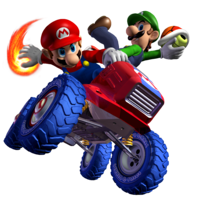
|
Mario | Medium | Red Fire | Fireball |
| Luigi | Medium | Green Fire | Fireball | |
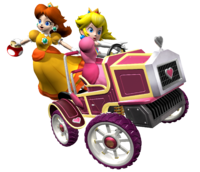
|
Peach | Medium | Heart Coach | Heart |
| Daisy(new) | Medium | Bloom Coach | ||
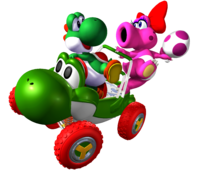
|
Yoshi | Medium | Turbo Yoshi | Yoshi's Egg |
| Birdo(new) | Medium | Turbo Birdo | Birdo's Egg | |
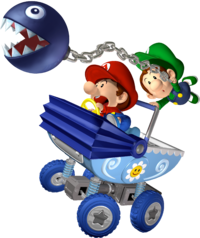
|
Baby Mario(new) | Light | Goo-Goo Buggy | Chain Chomp |
| Baby Luigi(new) | Light | Rattle Buggy | ||
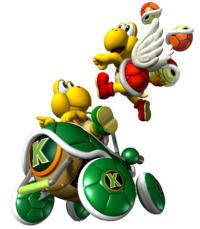
|
Koopa | Light | Koopa Dasher | Triple Green Shells and Triple Red Shells |
| Paratroopa(new) | Light | Para-Wing | ||
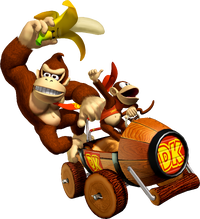
|
Donkey Kong | Heavy | DK Jumbo | Giant Banana |
| Diddy Kong(new) | Light | Barrel Train | ||
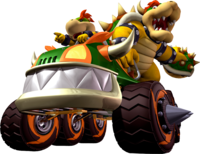
|
Bowser | Heavy | Koopa King | Bowser's Shell |
| Bowser Jr.(new) | Light | Bullet Blaster | ||
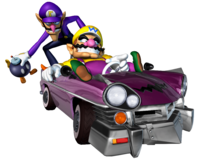
|
Wario | Heavy | Wario Car | Bob-omb |
| Waluigi(new) | Medium | Waluigi Racer | ||
Unlockable drivers
| Drivers | Weight | Default kart | Special item | Unlock method | |
|---|---|---|---|---|---|
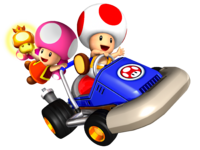
|
Toad | Light | Toad Kart | Golden Mushroom | Win the 100cc Special Cup |
| Toadette(new) | Light | Toadette Kart | |||
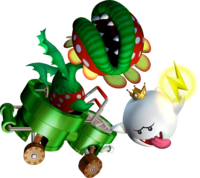
|
Petey Piranha(new) | Heavy | Piranha Pipes | All (excluding green fireballs and Birdo's egg) | Win the Mirror Star Cup |
| King Boo(new) | Heavy | Boo Pipes | |||
Supporting characters
In addition to the playable drivers, numerous other Super Mario franchise characters play supporting roles in the game as well. Lakitu reprises his role as the referee, meaning that he signals the start of each and every race and battle with his starting lights, alerts players when they complete a lap around the course, tells the drivers when they are going in the wrong direction, waves the checkered flag to finish the race at the finish line, and returns drivers to the track if they land themselves in a dangerous predicament (i.e. falling off the course). Other characters who make cameos include Shy Guys, Piranha Plants, Cataquacks, and Dinosaurs. Toadsworth drives the winners of a cup around Peach Beach in the Parade Kart. Piantas and Nokis from Super Mario Sunshine cheer the racers on in some courses and join them during the Award Ceremony.
Karts
Twenty-one karts are available in Mario Kart: Double Dash!!, notable for having different designs and appearances. There is one kart for each character, plus the Parade Kart. Every kart has three ratings, rated by the number of stars. The maximum amount is five.
- Acceleration: How quickly a kart can achieve its top speed.
- Speed: The level of top speed when the kart goes forward.
- Weight: The weight of the kart.
Just as the characters are classified according to their weights, karts are split into three groups in size with some general characteristics:
- Light: Lightweight karts show good acceleration but poor top speed and low weight. They can be easily bumped away by heavier karts. They do not lose a lot of speed when they go off course, but their turning is too wide.
- Medium: Medium-weight vehicles show average top speed and acceleration. Some karts within this group have slightly varied stats, however.
- Heavy: Heavyweight karts have the highest level of weight among the karts, capable of knocking away most light and some medium-weight vehicles/characters away. Many of these show high top speed, although their acceleration and off-road are fairly poor. They also have tighter turning.
As shown from the image, each combination of characters also determines the class of kart that is used for the race. The Parade Kart, unlocked by completing All-Cup Tour in Mirror Mode, however, can be driven by any combination of characters.
Default karts
These are the kart stats that are displayed in-game.
| Vehicle | Owner | Class | Speed | Acceleration | Weight |
|---|---|---|---|---|---|
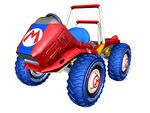 Red Fire |
Mario | Medium | 3 ★★★☆☆ |
3 ★★★☆☆ |
3 ★★★☆☆ |
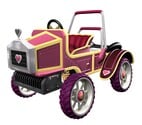 Heart Coach |
Peach | Medium | 2 ★★☆☆☆ |
4 ★★★★☆ |
3 ★★★☆☆ |
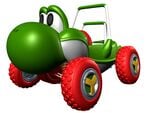 Turbo Yoshi |
Yoshi | Medium | 2 ★★☆☆☆ |
4 ★★★★☆ |
3 ★★★☆☆ |
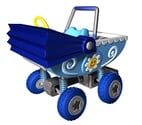 Goo-Goo Buggy |
Baby Mario | Light | 1 ★☆☆☆☆ |
5 ★★★★★ |
2 ★★☆☆☆ |
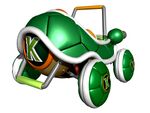 Koopa Dasher |
Koopa | Light | 2 ★★☆☆☆ |
4 ★★★★☆ |
2 ★★☆☆☆ |
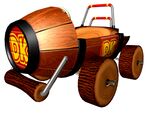 DK Jumbo |
Donkey Kong | Heavy | 4 ★★★★☆ |
2 ★★☆☆☆ |
4 ★★★★☆ |
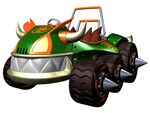 Koopa King |
Bowser | Heavy | 5 ★★★★★ |
1 ★☆☆☆☆ |
5 ★★★★★ |
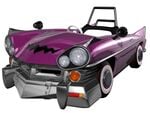 Wario Car |
Wario | Heavy | 4 ★★★★☆ |
2 ★★☆☆☆ |
4 ★★★★☆ |
Unlockable karts
| Vehicle | Owner | Class | Speed | Acceleration | Weight | Unlock method |
|---|---|---|---|---|---|---|
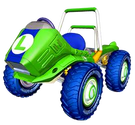 Green Fire |
Luigi | Medium | 4 ★★★★☆ |
2 ★★☆☆☆ |
2 ★★☆☆☆ |
Win the 50cc Mushroom Cup |
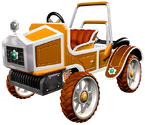 Bloom Coach |
Daisy | Medium | 3 ★★★☆☆ |
3 ★★★☆☆ |
2 ★★☆☆☆ |
Win the 50cc Flower Cup |
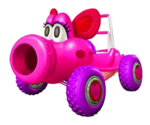 Turbo Birdo |
Birdo | Medium | 3 ★★★☆☆ |
3 ★★★☆☆ |
4 ★★★★☆ |
Win the 150cc Flower Cup |
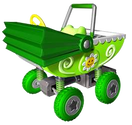 Rattle Buggy |
Baby Luigi | Light | 2 ★★☆☆☆ |
4 ★★★★☆ |
2 ★★☆☆☆ |
Win the 100cc Mushroom Cup |
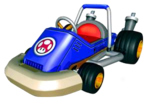 Toad Kart |
Toad | Light | 2 ★★☆☆☆ |
4 ★★★★☆ |
2 ★★☆☆☆ |
Win the 100cc Special Cup (unlocked alongside Toad and Toadette) |
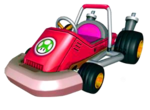 Toadette Kart |
Toadette | Light | 1 ★☆☆☆☆ |
5 ★★★★★ |
2 ★★☆☆☆ |
Win the Mirror Mushroom Cup |
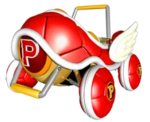 Para-Wing |
Paratroopa | Light | 1 ★☆☆☆☆ |
5 ★★★★★ |
2 ★★☆☆☆ |
Win the 50cc Star Cup |
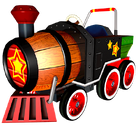 Barrel Train |
Diddy Kong | Light | 4 ★★★★☆ |
2 ★★☆☆☆ |
3 ★★★☆☆ |
Win the 150cc Star Cup |
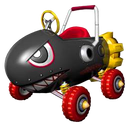 Bullet Blaster |
Bowser Jr. | Light | 4 ★★★★☆ |
3 ★★★☆☆ |
1 ★☆☆☆☆ |
Win the 50cc Special Cup |
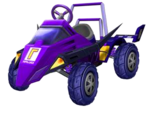 Waluigi Racer |
Waluigi | Medium | 3 ★★★☆☆ |
3 ★★★☆☆ |
3 ★★★☆☆ |
Win the 100cc Flower Cup |
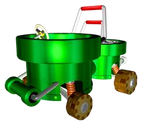 Piranha Pipes |
Petey Piranha | Heavy | 4 ★★★★☆ |
2 ★★☆☆☆ |
5 ★★★★★ |
Win the Mirror Star Cup (unlocked alongside Petey Piranha and King Boo) |
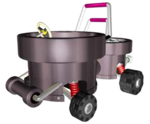 Boo Pipes |
King Boo | Heavy | 2 ★★☆☆☆ |
4 ★★★★☆ |
5 ★★★★★ |
Win the Mirror Special Cup |
 Parade Kart |
None | Any weight | 4 ★★★★☆ |
3 ★★★☆☆ |
4 ★★★★☆ |
Win the Mirror All-Cup Tour |
Actual stats
The stars shown on the vehicle selection screen are less precise than the actual values used by the game;[5] Speed and Weight each have 9 distinct values rather than 5, and the differences in Acceleration are mainly due to two values, generating 9 possible combinations that do not necessarily line up with the menu stats: the first value affects mainly the first phase of acceleration while starting from a standstill, the second affects acceleration when the speed is higher than around 50% of the maximum speed.[6][7][8] When drifting, acceleration depends on values that are the same for all karts. Drifting itself can begin when the speed of the kart is at least 15 km/h (26 units). When the speed is lower than that, trying to drift results in the kart having an acceleration value proportional to the first acceleration value, but considerably smaller than that.[6][9] The values determine acceleration in terms of increase of relative speed, the fraction of current speed to top speed, over time.[10]
Speed is reported in units, from which the values in the speedometer are calculated using the following conversion factors:[6]
Skm/h = Sunits / 1.75
Smph = Sunits / 2.5
Speed is actually capped at 175 units (100 km/h, 70 mph).[11]
Furthermore, there is a hidden Off-Road stat that determines a vehicle's top speed in most off-road terrains, such as grass. Weak off-road patches, like the yellow sand in Dry Dry Desert, reduce the kart's top speed by a fixed 20 units (~11 km/h, 8 mph). On the other hand, middle off-road patches, such as the grassy and sandy part where the Chain Chomp lies in Luigi Circuit, reduce speed to a value dependent on the kart chosen. Finally, heavy Off-Road areas such as the reddish sand in Dry Dry Desert or underwater parts, slow down all karts to a fixed 40 units speed (23 km/h, 16 mph).[6]
When shrunken by Lightning, the top speed in normal roads and weak off-road sections goes down by 20 units, while the top speed in medium off-road sections goes down by 10 units. The top speed in heavy off-road sections stays unaltered.[5]
All karts have their own Mini-Turbo value, however all light karts have a Mini-Turbo boost that lasts 30 frames, all medium karts have a 20 frames Mini-Turbo boost, and all heavy karts have a 10 frames Mini-Turbo boost. The Parade Kart also has a Mini-Turbo boost that lasts 30 frames.[6]
| Conventional Classification | |||||
|---|---|---|---|---|---|
| Vehicle | Top Speed | Off-Road | Acceleration | Weight | Mini-Turbo |
Red Fire |
5 | 5 | 4 | 5 | 2 |
Green Fire |
7 | 4 | 3 | 4 | 2 |
Heart Coach |
4 | 6 | 6 | 5 | 2 |
Bloom Coach |
6 | 4 | 5 | 3 | 2 |
Turbo Yoshi |
4 | 5 | 6 | 6 | 2 |
Turbo Birdo |
6 | 4 | 4 | 7 | 2 |
Goo-Goo Buggy |
1 | 9 | 9 | 2[stats 1] | 3 |
Rattle Buggy |
2 | 9 | 8 | 2 | 3 |
Toad Kart |
3 | 9 | 7 | 2 | 3 |
Toadette Kart |
1 | 9 | 9 | 2 | 3 |
Koopa Dasher |
2 | 8 | 8 | 3 | 3 |
Para-Wing |
1 | 8 | 9 | 3 | 3 |
DK Jumbo |
8 | 2 | 2 | 8 | 1 |
Barrel Train |
8 | 7 | 3 | 5 | 3 |
Koopa King |
9 | 1 | 1 | 9 | 1 |
Bullet Blaster |
8 | 1 | 4 | 1 | 3 |
Wario Car |
7 | 3 | 3 | 7 | 1 |
Waluigi Racer |
5 | 9 | 5 | 6 | 2 |
Piranha Pipes |
8 | 7 | 2 | 9 | 1 |
Boo Pipes |
2 | 9 | 8 | 9 | 1 |
Parade Kart |
7 | 3 | 4 | 7 | 3 |
- ^ In Battle Mode, the Goo-Goo Buggy's weight value is 1.
| Actual Data | ||||||||||||||
|---|---|---|---|---|---|---|---|---|---|---|---|---|---|---|
| Vehicle | Top Speed[stats2 1] | Weak Off-Road[stats2 1] | Medium Off-Road[stats2 1] | Acceleration | Weight | Mini-Turbo | ||||||||
| units | km/h | mph | units | km/h | mph | units | km/h | mph | First Value | Second Value | frames | |||
Red Fire |
140 | 80 | 56 | 120 | 68.6 | 48 | 80 | 45.7 | 32 | 0.3 | 0.005 | 2 | 20 | |
Green Fire |
142 | 81.1 | 56.8 | 122 | 69.7 | 48.8 | 77 | 44 | 30.8 | 0.15 | 0.005 | 1.75 | 20 | |
Heart Coach |
139 | 79.4 | 55.6 | 119 | 68 | 47.6 | 83 | 47.4 | 33.2 | 1 | 0.005 | 2 | 20 | |
Bloom Coach |
141 | 80.6 | 56.4 | 121 | 69.1 | 48.4 | 77 | 44 | 30.8 | 0.5 | 0.005 | 1.5 | 20 | |
Turbo Yoshi |
139 | 79.4 | 55.6 | 119 | 68 | 47.6 | 80 | 45.7 | 32 | 1 | 0.005 | 2.25 | 20 | |
Turbo Birdo |
141 | 80.6 | 56.4 | 121 | 69.1 | 48.4 | 77 | 44 | 30.8 | 0.3 | 0.005 | 2.5 | 20 | |
Goo-Goo Buggy |
136 | 77.7 | 54.4 | 116 | 66.3 | 46.4 | 92 | 52.6 | 36.8 | 3 | 0.01 | 1.25 | 30 | |
Rattle Buggy |
137 | 78.3 | 54.8 | 117 | 66.9 | 46.8 | 92 | 52.6 | 36.8 | 2 | 0.01 | 1.25 | 30 | |
Toad Kart |
138 | 78.9 | 55.2 | 118 | 67.4 | 47.2 | 92 | 52.6 | 36.8 | 1 | 0.01 | 1.25 | 30 | |
Toadette Kart |
136 | 77.7 | 54.4 | 116 | 66.3 | 46.4 | 92 | 52.6 | 36.8 | 3 | 0.01 | 1.25 | 30 | |
Koopa Dasher |
137 | 78.3 | 54.8 | 117 | 66.9 | 46.8 | 89 | 50.9 | 35.6 | 2 | 0.01 | 1.5 | 30 | |
Para-Wing |
136 | 77.7 | 54.4 | 116 | 66.3 | 46.4 | 89 | 50.9 | 35.6 | 3 | 0.01 | 1.5 | 30 | |
DK Jumbo |
143 | 81.7 | 57.2 | 123 | 70.3 | 49.2 | 71 | 40.6 | 28.4 | 0.1 | 0.005 | 2.75 | 10 | |
Barrel Train |
143 | 81.7 | 57.2 | 123 | 70.3 | 49.2 | 86 | 49.1 | 34.4 | 0.15 | 0.005 | 2 | 30 | |
Koopa King |
144 | 82.3 | 57.6 | 124 | 70.9 | 49.6 | 68 | 38.9 | 27.2 | 0.08 | 0.005 | 3 | 10 | |
Bullet Blaster |
143 | 81.7 | 57.2 | 123 | 70.3 | 49.2 | 68 | 38.9 | 27.2 | 0.3 | 0.005 | 1 | 30 | |
Wario Car |
142 | 81.1 | 56.8 | 122 | 69.7 | 48.8 | 74 | 42.3 | 29.6 | 0.15 | 0.005 | 2.5 | 10 | |
Waluigi Racer |
140 | 80 | 56 | 120 | 68.6 | 48 | 92 | 52.6 | 36.8 | 0.5 | 0.005 | 2.25 | 20 | |
Piranha Pipes |
143 | 81.7 | 57.2 | 123 | 70.3 | 49.2 | 86 | 49.1 | 34.4 | 0.1 | 0.005 | 3 | 10 | |
Boo Pipes |
137 | 78.3 | 54.8 | 117 | 66.9 | 46.8 | 92 | 52.6 | 36.8 | 2 | 0.01 | 3 | 10 | |
Parade Kart |
142 | 81.1 | 56.8 | 122 | 69.7 | 48.8 | 74 | 42.3 | 29.6 | 0.3 | 0.005 | 2.5 | 30 | |
Courses
Mario Kart: Double Dash!! contains sixteen new racing courses added to the series, along with six new battle courses. Each racecourse contains its own difficulty and gimmicks.
Battle courses
- Default
- Unlockable
Luigi's Mansion is unlocked by winning the 150cc Mushroom Cup, and Tilt-a-Kart is unlocked by winning the Mirror Flower Cup.
Staff Ghosts
This game follows Mario Kart 64 in including the possibility to race against Staff Ghosts, ghosts created by Nintendo staff as the main ghosts of the course. They can be unlocked by achieving a certain time on the respective course. Below is a table showing all Staff Ghosts and their respective times.[12]
Generally, the driver is the same character that the course is themed after according to the course's internal name, while the rider is their pair and the kart is the default-unlocked one shared between them; the exceptions are Baby Park, which is named after Baby Luigi internally yet has him as the rider while Baby Mario is the driver, Dry Dry Desert and Sherbet Land, which do not have character theming, and Rainbow Road, which also lacks character theming and also has an atypical pair of Mario and Peach on the Red Fire. Bowser Jr. is the only default character to not be a driver in any staff ghost, Bowser is the only one to not be a rider, and Mario and Peach are the only ones to have the same role twice, once with their respective standard partner and once with each other.
| Course | Driver | Rider | Kart | Time |
|---|---|---|---|---|
| Luigi Circuit | Luigi | Mario | Red Fire | 1:26.277 |
| Peach Beach | Peach | Daisy | Heart Coach | 1:20.404 |
| Baby Park | Baby Mario | Baby Luigi | Goo-Goo Buggy | 1:11.108 |
| Dry Dry Desert | Birdo | Yoshi | Turbo Yoshi | 1:50.755 |
| Mushroom Bridge | Koopa | Paratroopa | Koopa Dasher | 1:31.458 |
| Mario Circuit | Mario | Luigi | Red Fire | 1:41.384 |
| Daisy Cruiser | Daisy | Peach | Heart Coach | 1:52.207 |
| Waluigi Stadium | Waluigi | Wario | Wario Car | 1:59.658 |
| Sherbet Land | Baby Luigi | Baby Mario | Goo-Goo Buggy | 1:25.904 |
| Mushroom City | Paratroopa | Koopa | Koopa Dasher | 1:50.663 |
| Yoshi Circuit | Yoshi | Birdo | Turbo Yoshi | 1:59.866 |
| DK Mountain | Donkey Kong | Diddy Kong | DK Jumbo | 2:12.639 |
| Wario Colosseum | Wario | Waluigi | Wario Car | 2:21.106 |
| Dino Dino Jungle | Diddy Kong | Donkey Kong | DK Jumbo | 2:00.908 |
| Bowser's Castle | Bowser | Bowser Jr. | Koopa King | 2:44.690 |
| Rainbow Road | Mario | Peach | Red Fire | 3:16.476 |
Items
Traditional items from Super Mario Kart through Mario Kart: Super Circuit appear in Mario Kart: Double Dash!! with a bunch of new power-ups to change a race drastically, such as stealing the opponent's place or item by using a Mushroom or reducing the racers to small size with the rare Lightning. The rear character obtains a determinate item by running into an Item Box. However, Double Item Boxes give items to both the rear character and driver. The variety of items depends on the kart's place. Leader racers tend to receive basic items such as Bananas or Green Shells, while those going under fourth place can receive rare items like a Star or a Spiny Shell.
Items are classified in two forms:
- Standard: Drivers can obtain these types of items when they go through an Item Box or Double Item Box.
- Special: Some drivers obtain a special item that other drivers cannot obtain by an Item Box. When a character holds a special item, the second character cannot obtain another special item via Item Box.
Standard Items
| Image | Name | Instruction Booklet Description |
|---|---|---|

|
Green Shell | Green Shells move in straight lines when thrown and knock karts for a loop if they hit. |

|
Red Shell | Red Shells seek out karts in front of you and flip them over when they strike. |

|
Spiny Shell | This winged wonder heads straight for the leader of the pack and explodes on impact. Any kart caught in the blast area will flip. |
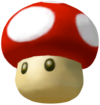
|
Mushroom | These turbo toadstools give karts brief speed bursts. |

|
Triple Mushrooms | Triple Mushrooms allow you to dash three times in a row. |

|
Banana | These slippery skins can be dropped or thrown in strategic spots to send rivals into sudden spins. |

|
Fake Item | These items of deception look just like real Item Boxes, so place them where your opponents won't expect. |

|
Star | Stars make karts temporarily invincible and increase their top speed by a hair. Karts hit by Star-wielding karts will go flying. |
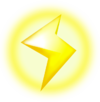
|
Lightning | This mighty bolt strikes all opponents at the same time, causing them to spin out, drop their items, and shrink in size, which reduces their max speeds. |
Special Items
- Main article: Special Item (Mario Kart series)
| Image | Name | Characters | Instruction Booklet Description |
|---|---|---|---|
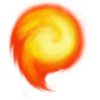 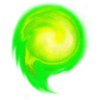
|
Fireballs | Mario & Luigi | They split up after they're thrown and go sliding ahead. These powerful pyrotechnics can take out multiple opponents at once. |

|
Heart (new) |
Peach & Daisy | Flying hearts surround the royal ladies' karts, and any item that hits them becomes theirs to use. A cute and handy item. |
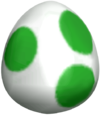 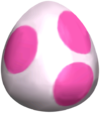
|
Yoshi's Egg (Birdo's Egg) (new) |
Yoshi & Birdo | These eggs roll down the road and home in on opponents. When they hit and break, they'll drop three more items. |

|
Chain Chomp (new) |
Baby Mario & Baby Luigi | This fearsome beast chases karts with reckless abandon, pulling the babies behind it at breakneck speeds. |

|
Golden Mushroom | Toad & Toadette | N/A (Temporarily allows consecutive speed boosts) |
 
|
Triple Green Shells and Triple Red Shells | Koopa & Paratroopa | Don't let Koopa and Paratroopa worry about not having enough shells. Get three at a time! |

|
Giant Banana (new) |
Donkey Kong & Diddy Kong | Only DK and Diddy know where these monstrous fruit can be found. Once they're in the road, they're tough to manoeuvre around. |

|
Bowser's Shell (new) |
Bowser & Bowser Jr. | An awe-inspiring giant shell! As it careens down the road, slamming and ramming into karts, it's the very image of Bowser himself. |
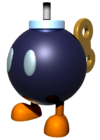
|
Bob-omb (new) |
Wario & Waluigi | Take aim and give your opponents an explosive surprise. Mess up, and you might just hit yourself! This item's dangerous... |
- Petey Piranha and King Boo have the ability to obtain any special item, excluding green Fireballs and Birdo's Egg.
- Note: Although special items can only be obtained by the characters they are assigned to, if a player is holding a special item, another player can steal it by colliding with the player holding the item while under the influence of a Mushroom, Star, or Slide Attack. Also, any character can get any special item in Battle Mode. Finally, in Co-Op Mode, the driver can pass a special item to the person in the back.
Unlocking matrix
Winning first on most cups for each difficulty unlocks a specific reward. The easier versions of the All-Cup Tour do not, but they are still required to unlock the special ending picture and title screen.
| Class | Mushroom Cup | Flower Cup | Star Cup | Special Cup | All-Cup Tour |
|---|---|---|---|---|---|
| 50cc | Green Fire | Bloom Coach | Para-Wing | Bullet Blaster | N/A |
| 100cc | Rattle Buggy | Waluigi Racer | Special Cup | Toad, Toadette, and Toad Kart | N/A |
| 150cc | Luigi's Mansion | Turbo Birdo | Barrel Train | All-Cup Tour | Mirror |
| Mirror | Toadette Kart | Tilt-a-Kart | Petey Piranha, King Boo, and Piranha Pipes | Boo Pipes | Parade Kart |
Driving techniques
Drifting and mini turbo
- Main article: Drift
Drifting prevents racers from losing speed in turns or from going off the course. By keeping the controller's ![]() (or
(or ![]() ) button pressed, and tilting the stick to either side, racers make the kart begin a turn. While drifting, racers can gain a momentary speed boost by tilting the control stick to either side, opposite to a corner's direction. The kart then starts to produce sparks on its wheels. Doing this two times more, racers make the sparks become orange, then blue. Then, a mini turbo can be released right after the racer lets go of the
) button pressed, and tilting the stick to either side, racers make the kart begin a turn. While drifting, racers can gain a momentary speed boost by tilting the control stick to either side, opposite to a corner's direction. The kart then starts to produce sparks on its wheels. Doing this two times more, racers make the sparks become orange, then blue. Then, a mini turbo can be released right after the racer lets go of the ![]() (or
(or ![]() ) button.
) button.
This tactic can be used to perform "snaking" (continuous power sliding) and elude homing hazards such as Red Shells.
Rocket Start
- Main article: Rocket Start
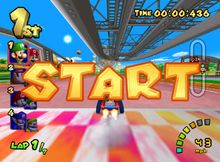
A Rocket Start is a speed boost given to a kart when a race starts out. To perform, racers have to press the ![]() button to accelerate right when Lakitu's lights turn green or by tapping the button repeatedly while Lakitu counts down.
button to accelerate right when Lakitu's lights turn green or by tapping the button repeatedly while Lakitu counts down.
Double Dash
- Main article: Rocket Start § Double Dash
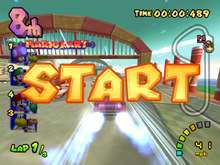
The Double Dash is similar to the Rocket Start. Although it is more powerful, it can only be performed in Co-op play. Both team members can press the ![]() button at the same time when Lakitu's light turns green. Upon being done perfectly, the kart bolts farther, leaving out a blue flame as a result. This technique is named after the game's subtitle.
button at the same time when Lakitu's light turns green. Upon being done perfectly, the kart bolts farther, leaving out a blue flame as a result. This technique is named after the game's subtitle.
Item steal
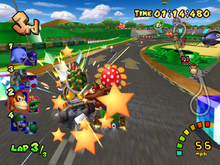
Item stealing is snatching a power-up directly from the rival's hands in a kart. There are three ways to steal an item as long as the player's rear character holds no items. Items can be stolen when the rear racer uses a mushroom or a star to hit an opposing kart and snatch the item that one of the rivals have. In Co-op Mode, the player's rear character can use the Slide Attack to knock other rivals and take their items away. However, if the rear character knocks a rival kart with two players holding an item, the character can get the rival rear character's item, while the rival driver drops the other item onto the track.
LAN Mode
Using the Nintendo GameCube Broadband Adapter (sold separately) attached to the game system, in Mario Kart: Double Dash!! it is possible to play via Local Area Network (LAN), using up to eight Nintendo GameCube systems connected to a hub device, or also using two consoles connected together through a cross-cable, where more than four players can join a race locally. This means that up to sixteen users can play at the same time with their friends using two or more GameCube systems with the Mario Kart: Double Dash!! game discs on.
After connecting the systems to the hub, the players should turn the systems' power button to begin. The LAN Mode option appears on screen to confirm the selection. Once LAN Mode is selected and confirmed on all participating game systems and the connections have been established, the Select Mode displays. Players may proceed by pressing the controller's ![]() button, the LAN Mode title screen displays to enter to play.
button, the LAN Mode title screen displays to enter to play.
LAN Mode does not work on the Wii, as the system disables the Ethernet port when it switches to play GameCube games and the GameCube Broadband adapter is not compatible.
On the LAN Mode title screen, there are three options:
- Start Game: Begin Versus LAN play.
- Select Mode: Adjust LAN setup options. This allows users to choose the modes of play:
- Game Mode: Select one of these game modes available: Versus, Balloon Battle, or Shine Thief. Bob-omb Blast cannot be played in the LAN setup. Only in Versus mode can the number of laps on the tracks and the engine classes be changed.
- Order of Courses: Choose the way in which courses or stages are selected: Random, All courses, one course or All-cups (only for Versus).
- Co-op: Enable or Disable Cooperative Mode.
- Screen Division: Split the screen. This option applies to all TVs and is not available if there are more than four Nintendo GameCube systems in use.
- Quit LAN Mode: Stop playing LAN Mode.
Unlike the local multiplayer, the players' characters are chosen at random each time a race begins.
Toad and Toadette can be selected, providing they have been unlocked on one of the Memory Cards. Petey Piranha and King Boo however are never picked, even if they have been unlocked on one of the Memory Cards.
The kart that is picked is the one that belongs to the driver, unless either their respective kart has not been unlocked on any of the Memory Cards or the partner is a bigger weight class than the driver. This means that the Piranha Pipes, Boo Pipes, and Parade Kart cannot be used in LAN mode.
LAN connection
In this way, two to eight Nintendo GameCube systems are connected to an over-the-counter 10BASE-T hub. The LAN cables used to connect every game system to the hub must be compatible, otherwise, the connection is not carried out. Every Nintendo GameCube system has to have attached their Nintendo Broadband Adapter, and the Mario Kart: Double Dash!! game disc in hand, one per system. At last, the number of GameCube controllers used depends on the number of players present.
Cross-cable connection
Unlike LAN connection, where it uses a hub to connect GameCube systems to it, the Cross-cable connection requires of only two GameCube game systems connected between themselves, through a 10BASE-T hub-compatible cross-cable. The rest of the required equipment is similar: A Mario Kart: Double Dash!! game disc per system, the Nintendo Broadband Adapter attached to the game system, and the number of GameCube controllers regarding how many players participate.
Troubleshooting
Occasionally the users may experience malfunctions or be unable to connect due to technical problems.
- When using an incompatible LAN cable with the Hub in use, or using another type of cable different to the cross-cable to connect two systems directly.
- A LAN cable is not fully inserted into the Hub or any game system.
- A LAN cable was removed during the transfer of data.
- Any game system was turned off or the game system's RESET button was pressed in the process.
- When some device other than a Nintendo GameCube is connected to the Hub.
- When a Hub or LAN cable not compatible with the 10BASE-T standard is being used.
- When more than eight Nintendo GameCube systems have been connected.
Differences in split-screen races
Split-screen races typically have less features for maintaining game performance such as consistent load times and a stable frame-rate.
All courses
- Item Boxes have a brighter checkerboard texture, as opposed to clearer checkerboard texture.
- Dash Panels look slightly different.
Luigi Circuit
- The flowers on the grass are missing.
- The two blimps that fly above the track are also missing.
Peach Beach
- The Daisy Cruiser in the background is absent.
- The Piantas are absent.
- Before the finish line, the Pianta statue fountain is replaced by a Power Star. The fountain is also not active.
Baby Park
- The Yoshi helicopter is removed.
Dry Dry Desert
- Just before the finish line, the Item Boxes are removed from the three small hills.
- The smaller Pokeys are missing.
Mushroom Bridge
- There are no whirlpools in the water.
- There are only two trucks, three regular cars, four buses, two moving Item Boxes, one Mushroom-shaped car, and two Bomb-cars.
- Mushroom City and Peach's Castle do not appear in the background.
- The advertisement signs after the green tunnel are missing.
- The Wiggler Wagon on Mushroom Bridge is only five body segments long, as opposed to being ten body segments long.
- All shadows except vehicles and the player karts are missing.
Mario Circuit
- There are fewer Goombas and Piranha Plants.
Daisy Cruiser
- The umbrellas are absent.
- The Piantas are absent.
- Areas normally blocked off by traffic cones are instead blocked off by barriers.
- The moving Item Boxes do not move and can spawn Double Item Boxes.
- The colorful banners above the curved staircase are removed.
- There are no shadows at Daisy Cruiser.
- The inside of the ship has no lights on the ceiling.
- There are less Item Boxes in the dining area.
- In the dining area, the tables that are not used as obstacles are absent.
- In the dining area, the items on top of the pillars were removed.
- There is no trapdoor over the entrance to the alternate route.
- In the alternate route under the floor, there is no fan in the tube, nor are there any colored pipes on the ceiling.
- The gears near the front of the ship are missing.
- Near the end, there are no life rings.
Waluigi Stadium
- The rings of fireballs on the ramps are absent.
- Except in VS mode, the metal Piranha Plants do not move their jaws.
- The moving arrow signs are absent.
- The Jumbotron is absent.
Sherbet Land
- There are only two moving Item Boxes at each end of the tunnel, as opposed to three.
- Only two Blue Shy Guys appear before the tunnel as opposed to three.
Mushroom City
- The traffic lights are absent.
- There are only four moving Item Boxes, two Mushroom-shaped cars, four regular cars, two Bomb-cars, one bus, and one truck.
- Mushroom Bridge is not seen in the background.
- All shadows except vehicles and the player karts are missing.
Yoshi Circuit
- Some of the Piranha Plants are missing.
- The Sunshine, the Daisy Cruiser, and the Yoshi Helicopter do not appear.
DK Mountain
- Boulders are less common.
- At the cliff area, one of the Item Boxes is absent.
Wario Colosseum
- The rings of fireballs on the ramps are absent.
- Coming off the first jump ramp after entering the dome, there are only four item boxes as opposed to five.
Dino Dino Jungle
- The volcanoes in the background of the track near the finish line, including the volcano from DK Mountain, are absent.
- In the area where there are Item Boxes on the trunks, the Item Boxes are removed.
- In the area between Nossie's feet, there are only two Item boxes, rather than four.
- There are fewer dinosaurs.
- In the first alternate route area where the bridge splits, there is only one Double Item Box instead of two.
- Near the end, before the finish line, there are only two moving Item Boxes instead of four.
- The crystals and pillar formations in the tunnels are removed.
Bowser's Castle
- Only two of the Thwomps are present.
- The Podoboos are removed.
- In the circular room with fireballs revolving around a pillar in the center, three of the six rotating fireballs are removed.
- The Bowser statue shoots fireballs at a slower rate.
Rainbow Road
- At the second sharp turn area, one of the Item Boxes is removed.
- Mushroom City is absent.
- All the floating items are removed.
Bonus disc
Preorders for Mario Kart: Double Dash!! also gave customers a bonus disc containing playable demos, game trailers, and content that can be transferred to Fire Emblem on the Game Boy Advance. The disc came in a special two-disc game box, and the cover for the game had the line "Includes BONUS DISC with playable demos!" written across the bottom right.
Content for the bonus disc includes:
- Mario Party 5 demo - Five minigames can be played with up to four players: Coney Island, Button Mashers, Shy Guy Showdown, Dinger Derby, and Pushy Penguins.
- F-Zero GX demo
- Sonic Heroes demo
- Star Wars Rogue Squadron III: Rebel Strike demo
- Teenage Mutant Ninja Turtles demo
- Final Fantasy Crystal Chronicles trailer
- 1080° Avalanche trailer
- Pokémon Colosseum Japanese pre-release trailer
- Kirby Air Ride trailer, with a trailer for the Kirby: Right Back At Ya! cartoon playing before it
- Harry Potter: Quidditch World Cup trailer
- SpongeBob SquarePants: Battle for Bikini Bottom trailer
- NBA Live 2004 trailer
- Two soundtrack pieces and various items for Fire Emblem
Staff
- Main article: List of Mario Kart: Double Dash!! staff
Yasuyuki Oyagi was one of directors of the game along with Futoshi Shirai and Daiji Imai. Oyagi previously served as the assisant director of Mario Kart 64 and would later take the role of director in future Mario Kart titles. Shinobu Nagata, who composed some of the songs in Super Mario Sunshine, did the composition and arrangement of Peach Beach's music. In his first credited role under a Super Mario game, Ichiro Suzuki served as debug support.
Pre-release and unused content
The models of the characters are from Super Smash Bros. Melee, and Mario and Luigi are seen in this trailer of a very early build of the game, driving separately, each in a simple, blue kart.
Donkey Kong Jr. was also seen in an early build of the character selection screen, but was scrapped in the end, likely replaced with Diddy Kong.
In the data of a demo version, there are references to a Reverse Cup, which may have had courses played backwards. There is a texture and 3D models of the trophies for this cup. Racing on courses in the reverse direction would not be fully implemented until Mario Kart Tour.
Glitches
- Main article: List of Mario Kart: Double Dash!! glitches
Permanent upside-down car
This glitch only works with the Parade Kart. To perform the glitch, the player should go to a place where they can get smashed by a course obstacle, such as the Thwomps in Bowser's Castle or the blue dinosaur in Dino Dino Jungle (Bowser's Castle is preferred because the Thwomps are stationary). This glitch best works for two players, as timing is needed. One player should drive underneath a Thwomp, while the other should receive an explosive power-up, either a Spiny Shell or a Bob-omb. When received, the player should fire the item at the correct moment, blasting the kart into the air and getting smashed under the floating Thwomp. After falling down, if done correctly, the player remains upside down. Note that the player is invincible in this position and the player can only revert to a normal position if Lightning strikes them and a Thwomp afterward.
Reception
Critical reception
The game received favorable reviews, attaining an average score of 87.20% on GameRankings based on 73 reviews and an average score of 87 on Metacritic based on 58 reviews.[13][14]
Spencer McIlvaine of Nintendo Life gave the game 9 stars out of 10, praising the game as being a worthy successor to the Mario Kart franchise, despite that it has less innovation than the other games. He concluded with "Nevertheless, the game has lost some of the edge that it had in its first two outings and shows fewer innovative ideas here. This time around the game was mostly about better graphics and less buggy programming with a few gimmicks thrown in like having two drivers instead of one. As a result, Double Dash is not the most recommended Mario Kart game in the franchise. But compared to other games in general it's still one heck of a ride."[15] Tom Bramwell of Eurogamer gave the game a score of 9 out of 10. He praised the game for adding more content, especially the online LAN mode. He wrote, "In my opinion, it's not a better game than the original Super Mario Kart, but it is the closest anyone's ever come, and one of the finest pieces of electronic entertainment ever developed." He also stated that rating Mario Kart Double Dash!! was the hardest thing he did because he always wanted to write about it.[16]
On the contrast, Edge Magazine UK gave the game a 5 out of 10, criticizing the game of "not being a racing game any more".[17] Fran Mirabella III of IGN gave the game a score of 7.9 out of 10. He criticized that Mario Kart Double Dash!! felt very similar to Mario Kart 64 and although it gets the job done that it felt that it had wasted potential. He praised the multiplayer for being superb.[18]
| Reviews | |||
|---|---|---|---|
| Release | Reviewer, Publication | Score | Comment |
| Nintendo GameCube | Spencer McIlvaine, Nintendo Life | 9/10 | "Mario Kart is a staple in the Nintendo library and Double Dash is a worthy successor to that tradition. This franchise pre-dates the Smash Bros. franchise and for many Nintendo fans this is the must have multi-player title on any system. As a result, Mario Kart Double Dash enjoyed tremendous success on the Gamecube and was even included in a bundle with the system at one point. Nevertheless, the game has lost some of the edge that it had in its first two outings and shows fewer innovative ideas here. This time around the game was mostly about better graphics and less buggy programming with a few gimmicks thrown in like having two drivers instead of one. As a result, Double Dash is not the most recommended Mario Kart game in the franchise. But compared to other games in general it's still one heck of a ride." |
| Nintendo GameCube | Tom Bramwell, Eurogamer | 9/10 | "In my opinion, it's not a better game than the original Super Mario Kart, but it is the closest anyone's ever come, and one of the finest pieces of electronic entertainment ever developed." |
| Nintendo GameCube | Fran Mirabella III, IGN | 7.9/10 | "I only hope that Nintendo pours more production into the sequel and remembers that just because Mario Kart was once designed for the younger crowd, doesn't mean it can't become an everyone title with some complexity to it." |
| Aggregators | |||
| Compiler | Platform / Score | ||
| Metacritic | 87 | ||
| GameRankings | 87.20% | ||
Sales
Mario Kart: Double Dash!! is the second best-selling game for the Nintendo GameCube, right behind Super Smash Bros. Melee, with approximately 7 million copies sold, including 3.8 million copies in the United States,[19] and over 802,000 units in Japan, as of December 31, 2009.[20]
Gallery
- For this subject's image gallery, see Gallery:Mario Kart: Double Dash!!
Bowser and Bowser Jr. on the Koopa King
Mixed teams racing on Luigi Circuit.
Default teams racing on DK Mountain
Media
- For a complete list of media for this subject, see List of Mario Kart: Double Dash!! media.
References to other games
- Super Mario Bros.: The music for "Tilt-a-Kart" starts out with the famous ground theme, and it features Mario's 8-bit sprite from this game. The Warp Pipe in Mushroom Bridge is modeled after the Warp Pipes that appear in this game's underground level cutscenes.
- Yoshi's Cookie: In the battle stage Cookie Land, cookies are seen from this game in the background. The level itself is also based off this game.
- Super Mario World 2: Yoshi's Island: Baby Luigi reappears as a playable character. Yoshi Circuit has a helicopter modelled after Helicopter Yoshi.
- Super Mario 64: When an item hits the player's heart barrier, a sound similar to that of the Spinning Heart from this game can be heard.
- Super Mario Kart: The logo of this game can be seen in Mushroom City and Dry Dry Desert.
- Mario Kart 64: The name "Sherbet Land" is taken from this game. Also, Waluigi Stadium resembles Wario Stadium and the horn used on the Bloom Coach is the same horn used by the white cars from Toad's Turnpike. Also, the Heart Coach, Bloom Coach, Piranha Pipes, and Boo Pipes share an engine sound similar to Peach's and Yoshi's karts from Mario Kart 64. The music for Rainbow Road contains a segment of Mario Kart 64's Rainbow Road music.
- Super Smash Bros.: Mario's red Fireballs and Luigi's green Fireballs were reused as Mario and Luigi's special items in this game.
- Luigi's Mansion: The battle course Luigi's Mansion is based on this game, and the A Rank Mansion from this game's ending can be seen in the background of Luigi Circuit. King Boo returns from this game as well.
- Wario Land 4: The Wario Car is taken from this game.
- Super Mario Sunshine: Peach Beach is heavily influenced by Gelato Beach. Shine Sprites appear on many billboards in the courses, as well as Shine Thief. Toadsworth, Piantas and Nokis appear in Peach Beach as well as the Award Ceremony. Additionally, a portion of the Award Ceremony's music incorporates the main theme from this game. The tracks have similar connections as some tracks can be seen in other tracks (e.g. DK Mountain can be seen at Baby Park). Also, in Yoshi Circuit, the Shadow Mario "M" sign appears on the first sign in the course, near the first turn. Bowser Jr. and Petey Piranha appear as playable characters.
- Mario Golf: Toadstool Tour: The countdown sound effect from Speed Golf and the artwork for the Chain Chomp item are recycled from this game.
References in later media
- Later Mario Kart games: Mario Kart: Double Dash!! is known to have set the standards for later games in many ways. The 3-second countdown, which was introduced in this game, was reused in all later Mario Kart games. This is also the first game in which, when the player starts another lap, Lakitu will hold the lap count signs with a fishing pole and appear on the left/right side of the player. This is also the first game to have its final lap music one semitone higher. This also marks the first time the player loses an item after falling off the course or being hit by certain items or obstacles. The Bob-omb item that was introduced as a Special Item for Wario and Waluigi in this game became a regular item in later games. The Chain Chomp item for Baby Mario and Baby Luigi was re-worked into the Bullet Bill item.
- Mario Power Tennis: The item boxes are identical to the ones in this game, and so are the items themselves and the item boxes' sound effects. Toadette makes a cameo appearance during the game's opening cutscene. The 3-second countdown sound effect is used when a round of Artist On the Court is about to begin.
- Dance Dance Revolution: Mario Mix: The songs "Rollercoasting" and "Bowser's Castle" are remixes of songs from Luigi Circuit, Mario Circuit, Yoshi Circuit and Bowser's Castle.
- Mario Superstar Baseball: Mario's Red Fireballs and Luigi's Green Fireballs were used as their special shots.
- Mario Kart DS: The character profile sprites of characters that reappeared in this game were reused, although mirrored. Also, Luigi Circuit, Baby Park, Mushroom Bridge, Yoshi Circuit, and the battle course Pipe Plaza reappear in this game. The Toad Kart resembles the Standard Kart. The Chain Chomp theme is used in one of the missions in this game.
- Mario Party 8: The Nossie seen in Dino Dino Jungle makes as a cameo in the background of the DK's Treetop Temple board.
- Mario & Sonic at the Olympic Games: The arrangement of "Invincibility BGM" is reused in this game. In the Nintendo DS version, the theme for Mario Circuit, Yoshi Circuit and Luigi Circuit appears as a selectable song in the Gallery under the name "Mario Bros. Circuits".
- Super Smash Bros. Brawl and Super Smash Bros. for Nintendo 3DS / Wii U: The trees and flowers in the Mario Circuit stage take their design from this game. Also, the music for Rainbow Road appears in this stage, and several stickers and trophies reference Mario Kart: Double Dash!! as well.
- Mario Kart Wii: The standing character models and animation in the character select screen of characters that reappear in this game are shown again here, except for the newcomers for that installment. Also, Peach Beach, Waluigi Stadium, Mario Circuit, DK Mountain, and the battle course Cookie Land reappear in this game. The Grand Prix starting jingle is recycled to this game for both the Grand Prix and VS Race.
- Mario Kart 7: Daisy Cruiser and Dino Dino Jungle reappear in this game, and a modified version of the Barrel Train is an unlockable kart frame. A section of the music for this game's Bowser's Castle covers the main theme of Bowser's Castle.
- Mario Party 9: The track from this game, "Pandemonium", is an arrangement of the Battle Mode theme from Mario Kart: Double Dash!!
- Mario Kart Arcade GP DX: The Fusion Kart mechanic is most likely inspired by the two-person kart feature of this game.
- Mario & Sonic at the Sochi 2014 Olympic Winter Games: Mushroom Bridge appears as the location for Groove Pipe Snowboard.
- Mario Kart 8: Characters physically hold items. Dry Dry Desert and Sherbet Land return as retro courses, while Yoshi Circuit and Baby Park return as DLC.
- Mario Kart 8 Deluxe: Double Item Boxes and the Bob-omb Blast and Shine Thief battle sub-modes return. Luigi's Mansion reappears as a retro battle course. Waluigi Stadium, Daisy Cruiser, and DK Mountain return as part of the Booster Course Pass DLC.
- Super Smash Bros. Ultimate: The Rainbow Road music returns as a track that can be played in battles on any Mario Kart stage. Additionally, the Barrel Train, Goo-Goo Buggy, Turbo Yoshi, and Bloom Coach appear as spirits, using their artwork from Mario Kart: Double Dash!!
- Mario Kart Tour: Special Items return. Baby Park, Mushroom Bridge, Daisy Cruiser, Waluigi Stadium, Yoshi Circuit, DK Mountain, and Dino Dino Jungle appear as returning race courses. Cookie Land appears as a returning battle course. The Turbo Yoshi, Koopa Dasher, Bullet Blaster, Turbo Birdo, Goo-Goo Buggy, Para-Wing, DK Jumbo, Barrel Train, Koopa King, Piranha Pipes, and Boo Pipes return as karts. Additionally, a new kart, the Waluigi Racer Mk. 2, is a successor to the Waluigi Racer.
- Mario Kart Live: Home Circuit: The Chain Chomp returns as an item.
- The Super Mario Bros. Movie: The race start countdown sequence in the Illumination logo is based on the starting lights in Mario Kart: Double Dash!! held by Lakitu.
Names in other languages
| Language | Name | Meaning | Notes |
|---|---|---|---|
| Japanese | マリオカート ダブルダッシュ!![?] Mario Kāto Daburu Dasshu!! |
Mario Kart: Double Dash!! | |
| Chinese (traditional) | 瑪利歐賽車 Double Dash!![21] Mǎlì'ōu Sàichē Double Dash!! |
Mario Kart: Double Dash!! | |
| French | Mario Kart: Double Dash!![?] | - | |
| German | Mario Kart: Double Dash!![?] | - | |
| Italian | Mario Kart: Double Dash!![?] | - | |
| Korean | 마리오카트 더블대시!![?] Mario Kateu Deobeul Daesi!! |
Mario Kart: Double Dash!! | |
| Spanish | Mario Kart: Double Dash!![?] | - |
Trivia
- This is the last main Mario Kart game to use the original series' logo for its box art and title screen. The next installment would introduce the new and current logo on the box art and title screen, though the original logo would still be used on courses' starting banners until Mario Kart 7.
- On the box art for the international releases, the "L" on Luigi's cap is backwards.
- Mario's reflection in one of the promotional renders does not match Mario's expression. This is because at the time, 3D game artists relied on using environment mapping to mimic the reflective effects of metal. The environment map is a separate 2D image used to approximate a reflection. It is likely the environment map is used from another promotional render where it would match the facial expression of Mario's reflection.
References
- ^ (November 14, 2003). DASH INTO STORES NOW!! Nintendo Australia. Retrieved May 27, 2024.
- ^ CONSOLIDATED FINANCIAL STATEMENTS - Nintendo Co., Ltd. and Consolidated Subsidiaries. nintendo.co.jp. Retrieved April 5, 2020.
- ^ Mario Kart: Double Dash!! (KR). Scanlines16.com. Retrieved April 29, 2018.
- ^ Vuckovic, D. Mario Kart Double Dash now Players Choice. Vooks. Retrieved January 9, 2022.
- ^ a b A transcription of the actual stats of the vehicles used in the game.
- ^ a b c d e Observations on how to read the transcribed in-game data.
- ^ Mister Wu's raw Mario Kart data (November 22, 2015). MKDD - A more thorough acceleration test. YouTube. Retrieved January 11, 2016.
- ^ Mister Wu's raw Mario Kart data (February 1, 2016). MKDD - The second acceleration parameter. YouTube. Retrieved May 9, 2016.
- ^ Mister Wu's raw Mario Kart data (December 8, 2015). MKDD - acceleration while drifting test. YouTube. Retrieved March 23, 2016.
- ^ Mister Wu's raw Mario Kart data (February 1, 2016). MKDD - The acceleration determined by the acceleration parameters is relative. YouTube. Retrieved May 9,2016.
- ^ Thomas Beumann (April 2012). MKDD for Noobs - Techniques. Retrieved November 2, 2015.
- ^ [1]
- ^ http://www.gamerankings.com/gamecube/516710-mario-kart-double-dash/index.html
- ^ http://www.metacritic.com/game/gamecube/mario-kart-double-dash!!/
- ^ http://www.nintendolife.com/reviews/gamecube/mario_kart_double_dash
- ^ http://www.eurogamer.net/articles/r_mariokartdd_gc
- ^ Edge, page 98
- ^ http://www.ign.com/articles/2003/11/11/mario-kart-double-dash-2
- ^ http://web.archive.org/web/20070106203333/www.the-magicbox.com/Chart-USPlatinum.shtml
- ^ http://web.archive.org/web/20050225220704/www5e.biglobe.ne.jp/~hokora/gcrank.html
- ^ Official Chinese website for the Super Mario Bros. 35th Anniversary. Retrieved October 23, 2020.
External links
- Official North American website (archive)
- Official Japanese website
- Official European (UK) microsite[dead link]
- Official European (UK) website
| Nintendo GameCube games | |
|---|---|
| Super Mario franchise | Luigi's Mansion (2001) • Super Mario Sunshine (2002) • Mario Party 4 (2002) • Mario Golf: Toadstool Tour (2003) • Mario Kart: Double Dash!! (2003) • Mario Party 5 (2003) • Paper Mario: The Thousand-Year Door (2004) • Mario Power Tennis (2004) • Mario Party 6 (2004) • Dance Dance Revolution: Mario Mix (2005) • Mario Superstar Baseball (2005) • Mario Party 7 (2005) • Super Mario Strikers (2005) |
| Donkey Kong franchise | Donkey Konga (2003) • Donkey Konga 2 (2004) • Donkey Kong Jungle Beat (2004) • Donkey Konga 3 JP (2005) |
| Wario franchise | Wario World (2003) • WarioWare, Inc.: Mega Party Game$! (2003) |
| Other | Super Mario 128 (2000, demo) • Super Smash Bros. Melee (2001) • Nintendo Puzzle Collection (2003) • NBA Street V3 (2005) • SSX on Tour (Nintendo Village) (2005) • Donkey Kong Racing (cancelled) • Diddy Kong Racing Adventure (cancelled) |
